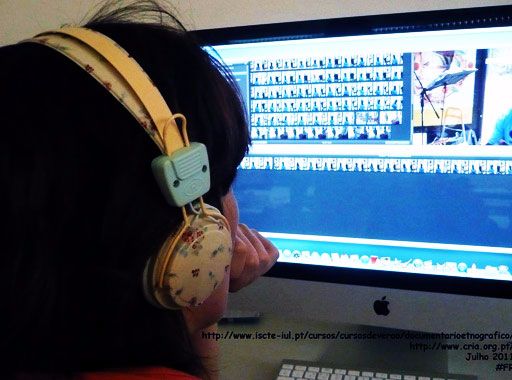Six laboratories at ISCTE-IUL support the research and teaching activities: the Communication Sciences Laboratory, the Audiovisual Laboratory, the Informatics Laboratory, the Laboratory of Social and Organizational Psychology, the Telecommunications Laboratory and the VITRUVIUS FabLab.
Laboratories
The Communication Sciences Lab (LCC-IUL) is focused on the analysis of communication practices in their different modes - from digital to analogue and from text to image, passing through sound.
In a context marked by an increased search for educational innovation and the diversification of research in communication science, the LCC-IUL lab offers its users a multifunctional space where they can conduct experiments and analyses that require access to specialized resources and tools.
Master's students, PhD students and researchers in Communication Sciences can use the lab, as well as journalists involved in the training of the Master's and PhD students.
The Audiovisual Laboratory is a technological and scientific structure equipped with digital technologies for the production and editing of image and sound.
It offers support to the research and teaching of Anthropology with a focus on experimentation and the creation of products and solutions for communicating anthropological knowledge.
It is open to researchers from the Centre for Research in Anthropology (CRIA) and other research units of Iscte who want to develop research projects that combine ethnographic practice and audiovisual production.
The lab also holds short and medium-term courses. It works in collaboration with the Department of Anthropology and was created through a partnership between CRIA and the School of Social Sciences and Humanities at Iscte.

The Informatics Lab is a computer centre that supports multidisciplinary teaching and research activity in the convergence of areas like Computer Science and Information Technologies, Mathematics (applied to computational problems), and Architecture and Urbanism (in its digital dimensions, either conceptual, modelling, simulation or fabrication):
- Digital Living Spaces;
- Information Systems;
- Software Systems Engineering;
- Complexity and Computational Modelling.

LAPSO is the laboratory used for Psychology research, learning and discovery at Iscte. It was formed in 2002 through a collaboration between the Centre for Investigation and Social Intervention (CIS-IUL) and the Department of Social and Organizational Psychology of Iscte (DEPSO). LAPSO encompasses the physical space of the laboratory and its associated equipment, materials, and staff. With the objective of boosting the development of students' skills in performing Psychological research, LAPSO welcomes research projects developed by students at all levels of education (undergraduate, masters, and doctoral) associated with DEPSO, as well as professors and senior researchers associated with DEPSO and CIS-IUL.
The Telecommunications Labs provide support in the research and education of MSc and PhD engineering students in the broad subject area of Telecommunications. The labs have appropriate prototype and measurement equipment, as well as computers. Each laboratory is associated to one of the following specific research topics:
- Radio Systems;
- Optics Communications and Photonics;
- Information Technology;
- Multimedia Signal Processing;
- Network Architecture and Protocols;
- Instrumentation and Measurements.

Vitruvius FabLab Iscte is a space for knowledge-sharing, manufacturing and innovation. With the development of information technology, there are an increasing number of tools that can be used in the processes of creation and construction. This laboratory is intended to develop CAD/CAM modelling to produce architectural models, explore modular building systems, and construct solutions based on participatory design processes aimed at solving real and local problems faced by communities.
The laboratory is not only used for internal investigation in various fields such as sociology, informatics, and management, but has also established a strong network of partnerships with international universities, industries and different individuals from various creative areas who need custom prototyping services. The digital fabrication laboratory supports innovation through the materialization of ideas.


